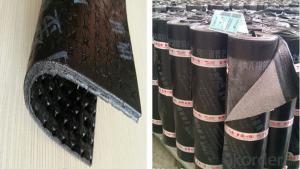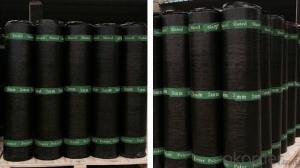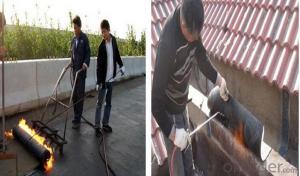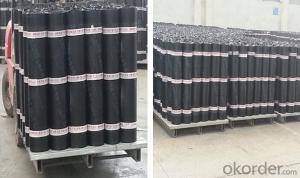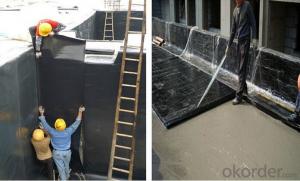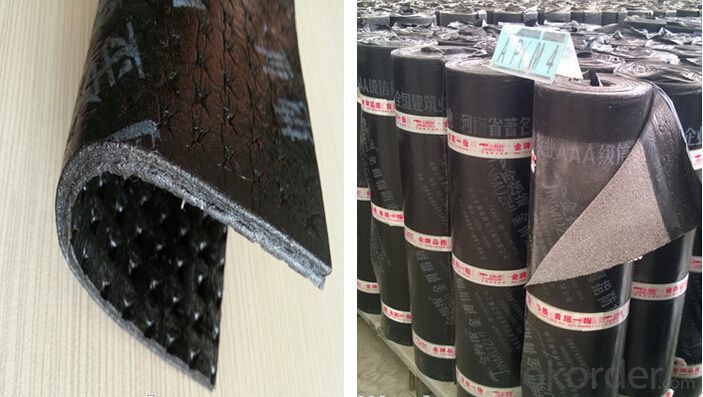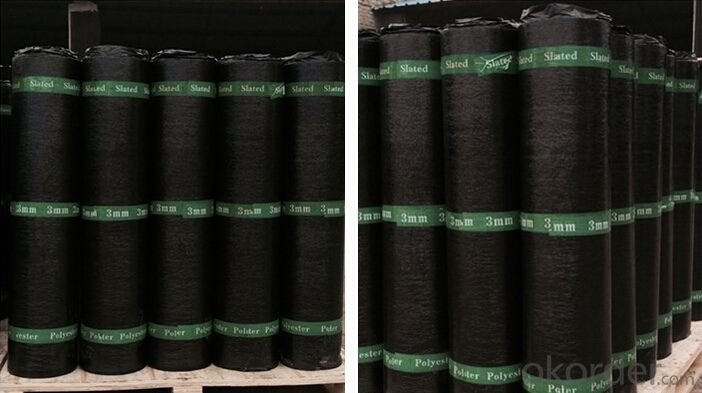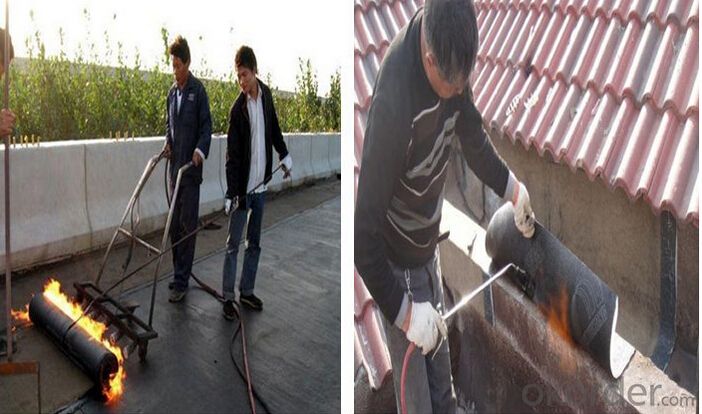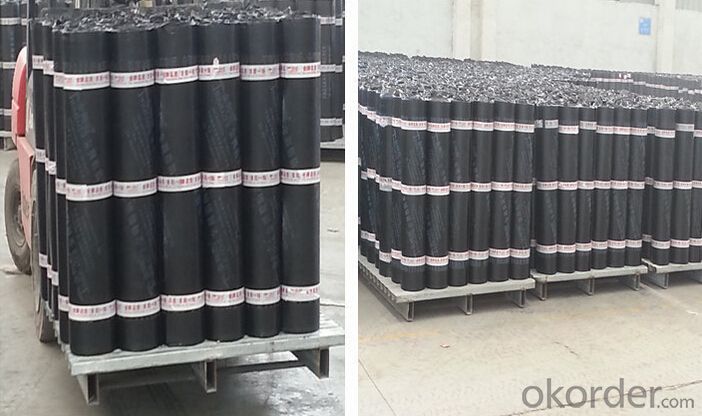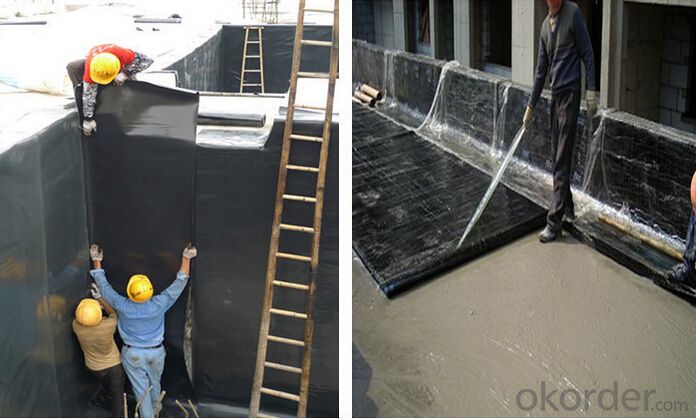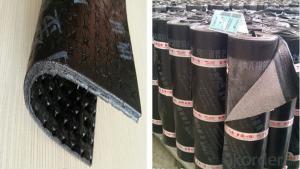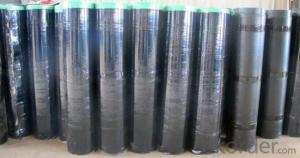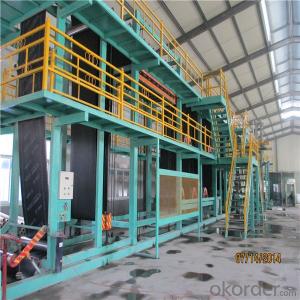SBS Modifing Bitumen Waterproofing Membrane
- Loading Port:
- Shanghai
- Payment Terms:
- TT OR LC
- Min Order Qty:
- 2000 m²
- Supply Capability:
- 200000 m²/month
OKorder Service Pledge
OKorder Financial Service
You Might Also Like
product description:
sbs waterproof membrane take the “Skin” type waterproof thought, according to the features of construction site, on the basis of width elastomeric modified bitumen waterproofing membrane, combining with features of wet-application self-adhesive membrane, use advanced equipment to produce 2 meters width that WP-SBS wet-application width elastomeric modified bitumen waterproofing membrane (Hereinafter referred to: WP-SBS membrane).WP-SBS is made of bitumen modified with Styrene-Butadiene- Styrene (SBS)as dipping and painting. Its upper surface covers PE membrane and color sand or schist, and lower surface is made of isolation material. Products correspond to the national standards GB18242-2008(elastomeric modified bitumen waterproofing membrane), paste by cement or cement mortar, and construct on the wet base, achieving tight and full adhesion with substrates, eliminating fluid-channeling layer, all above contribute to making a reliable “Skin” type waterproof system, which is a breakthrough innovation in ordinary modified bitumen membrane.
Characteristic
1.Good impermeability
2.Possess good tensile strength, elongation and size stability which could be well suited the substrate distortion and crack.
3.Good performance in anti-strength, anti-resistance , anti-erosion, anti-mildew, anti-weathering
4.SBS modified bitumen membrane is specially being applied in the cold area with low temperature, while APP modified bitumen membrane is applied in the area with high temperature.
5.Convenient installation
Applicable scope:
It is widely used for civil building roofing, underground, bridge, parking, pool, tunnel in the line of waterproofing and dampproofing, especially for the building under high temperature.
Application method:
1.Make sure the roof deck smooth ,clean and dry(Moisture<9%),then apply the surface of roof deck homogeneously with a kind bitumen paint till dry to start application.
2.There are two methods in application:
One way is by heating and melting method---Heat the polyethylene film of the membrane and roof deck surface by heating and melting method to be nearly melted (not flowing),then install the membrane fully bonded to the roof deck with overlaps of 5-10cm.
The other way is by cold adhesive method---Pour the cold adhesive homogeneously on the roof deck then roll the membrane to install it to be fully sticked to roof deck.
By heating and melting method and by cold adhesive can be used in alternation in application as requested.
3.After application ,a full serious inspection is required to make sure no air bubble ,no fold,no falling away etc to guarantee the waterproof life.
Our Services
1.If you need some advises for the waterproof construction, we have the best engineer to serve you.
2.We send the free samples to you by freight collect.
3.We will guarantee the quality and the competitive price.
4.We will give you the best packaging and safe shipping.
5.If any problem, we will always be right here waiting for you.
Packaging & Shipping
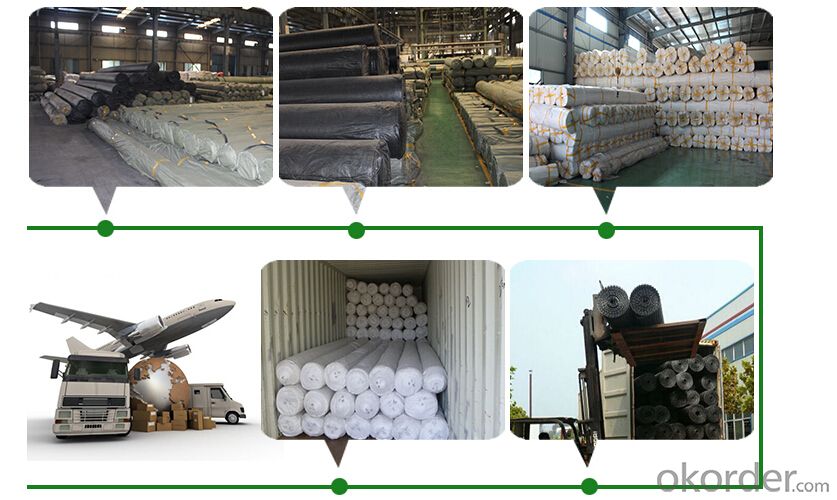
| Packing | Woven bag/PE bag packing or as customer request |
| Shipping | FOB Changsha,customized shipping terms and oppointed port accepted |
Technical parameter
| Item | Specifications | ||||||||
| Geotextile Unit Weight (g/m²) | 300 | 500 | 600 | 700 | 800 | 900 | 1000 | 1100 | |
| Geomembrane Thickness (mm) | 0.25-0.35 | 0.30-0.50 | |||||||
| Nominal Fracture Strength (KN/m) | 2.50 | 7.50 | 10 | 12 | 14 | 16 | 18 | 20 | |
| Breaking Strength (KN/m,≥,LD/TD) | 2.50 | 7.50 | 10 | 12 | 14 | 16 | 18 | 20 | |
| Standard Intensity Corresponding Elongation Rate (%) | 30~100 | ||||||||
| CBR Burst Strength (KN,≥) | 0.70 | 1.50 | 1.90 | 2.20 | 2.50 | 2.80 | 3.00 | 3.20 | |
| Longitudinal Tear Strength (KN,≥) | 0.05 | 0.25 | 0.32 | 0.40 | 0.48 | 0.56 | 0.62 | 0.70 | |
| Hydrostatic Pressve (Mpa) | See List Below | ||||||||
| Peel Strength (N/cm,≥) | 6 | ||||||||
| Vertical Permeability Coefficient (cm/s) | According to design or contract mentioned. | ||||||||
| Width Variation (%) | -1.00 | ||||||||
| Item | Geomembrane Thickness (mm) | ||||||||
| 0.20 | 0.30 | 0.40 | 0.50 | 0.60 | 0.70 | 0.80 | 1.00 | ||
| Hydrostatic Pressve (Mpa) | One geotextiles with one geomembrane | 0.40 | 0.50 | 0.60 | 0.80 | 1.00 | 1.20 | 1.40 | 1.60 |
| Two geotextiles with one geomembrane | 0.50 | 0.60 | 0.80 | 1.00 | 1.20 | 1.40 | 1.60 | 1.80 | |
Professional test machines ensure the products qualified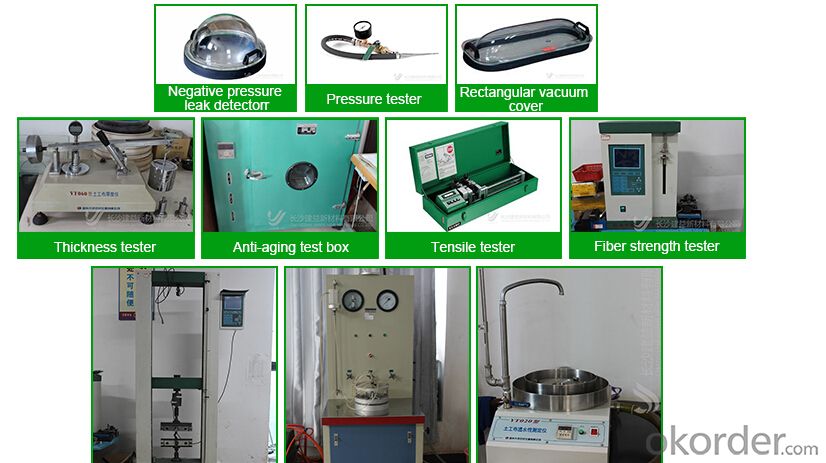 roduct certifications
roduct certifications
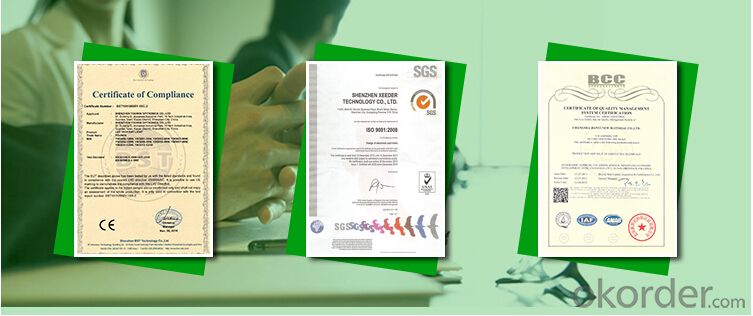
Inquiry Note
How to send an effective inquiry for saving your time?
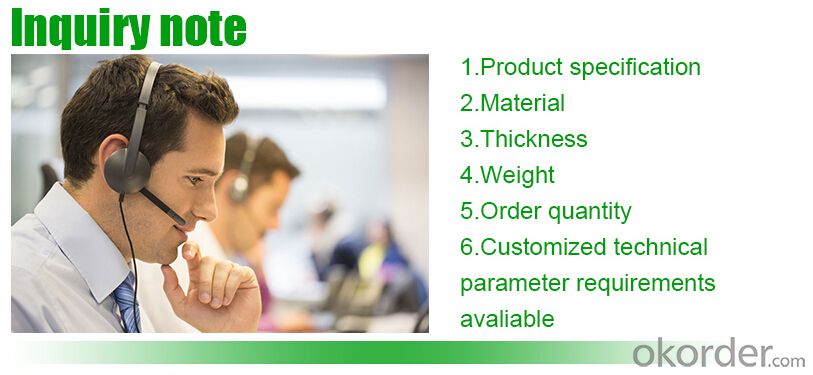
product show
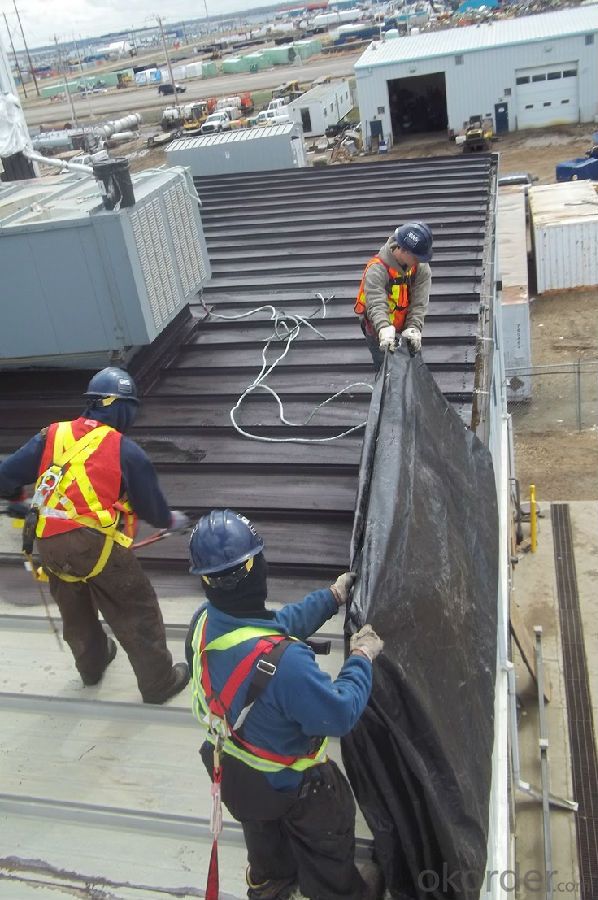
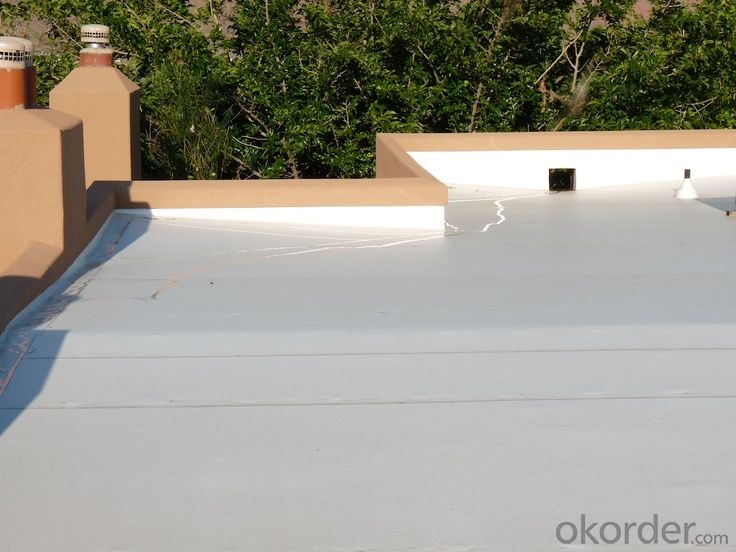
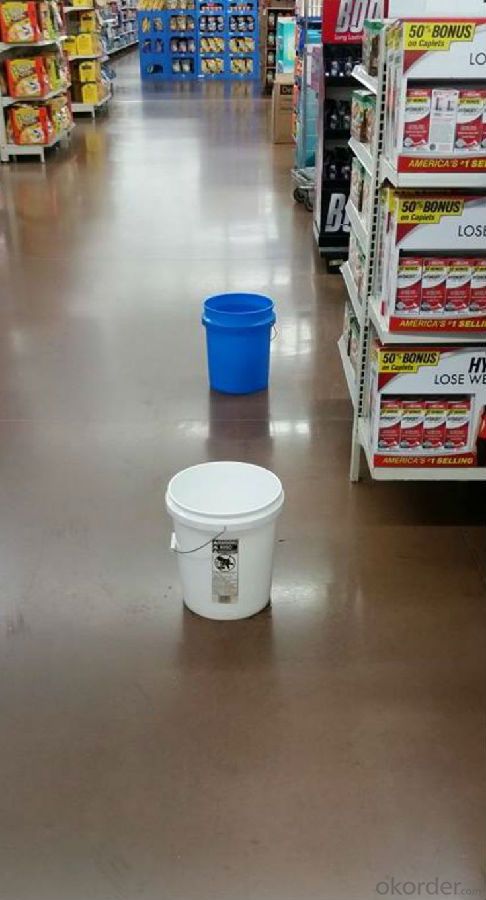
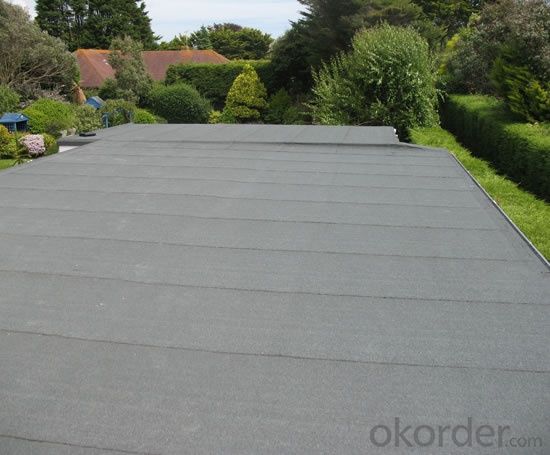
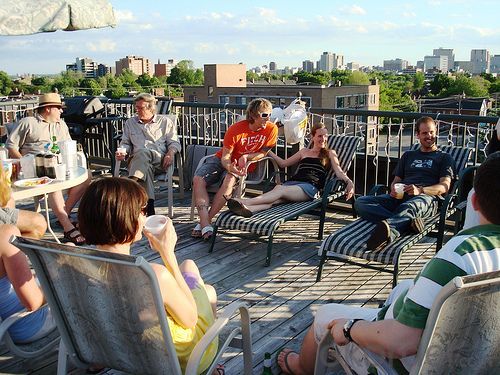
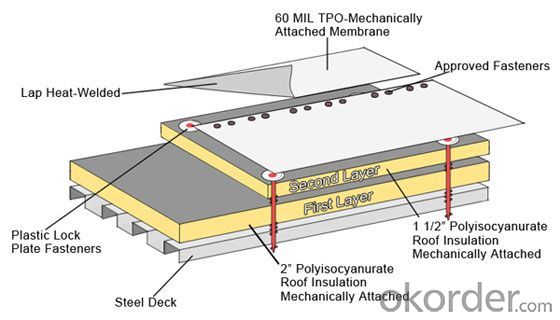
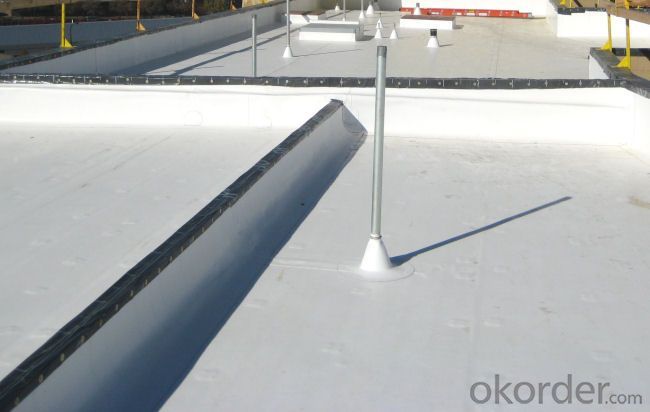
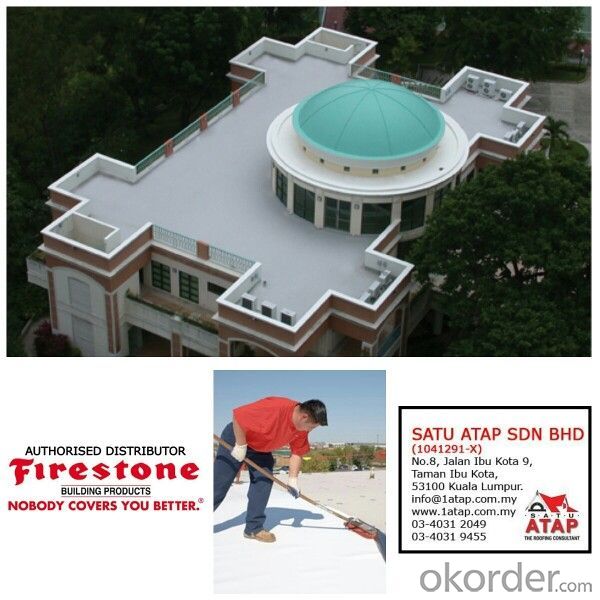
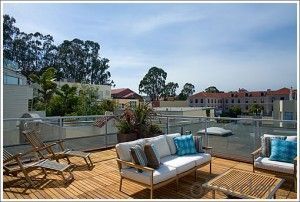
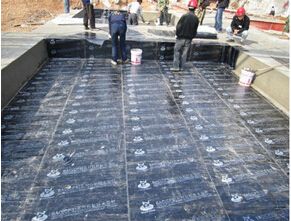
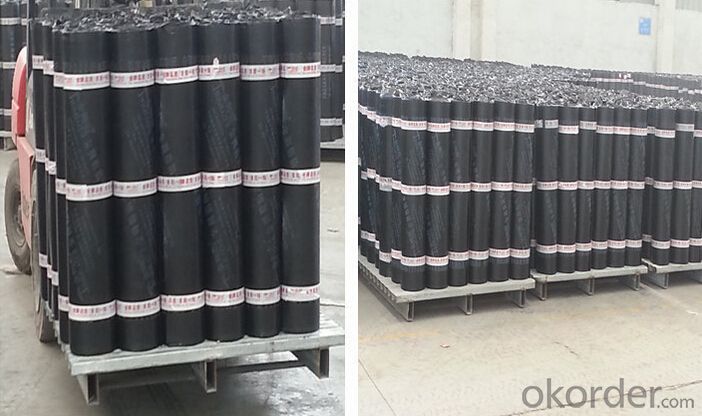
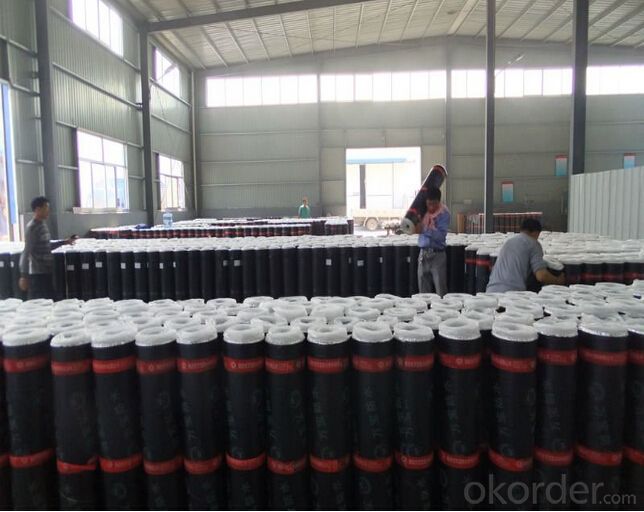
FAQ

- Q: Can a waterproofing membrane be applied to both interior and exterior surfaces?
- Yes, a waterproofing membrane can be applied to both interior and exterior surfaces. The purpose of a waterproofing membrane is to prevent water infiltration and protect the underlying surfaces. Whether it is applied on the inside or outside, the membrane serves the same purpose of creating a barrier against moisture. Interior waterproofing membranes are commonly used in basements and crawl spaces to prevent water seepage from the ground into the interior of the building. Exterior waterproofing membranes are typically applied on the exterior walls and foundations to prevent water penetration from rain, groundwater, or other external sources. Both types of membranes are designed to be durable, flexible, and resistant to water, ensuring the longevity and structural integrity of the surfaces they are applied to.
- Q: Can a waterproofing membrane be used on precast lead surfaces?
- Yes, a waterproofing membrane can be used on precast lead surfaces. Waterproofing membranes are commonly used to protect various types of surfaces, including precast concrete, metal, or lead surfaces. These membranes provide an effective barrier against water penetration, ensuring that the underlying structure remains dry and protected. Prior to applying the waterproofing membrane, it is important to ensure that the precast lead surface is clean, dry, and free from any contaminants. This will help to ensure proper adhesion of the membrane and maximize its effectiveness in preventing water infiltration. Additionally, it is recommended to consult with a professional or refer to the manufacturer's guidelines to ensure that the specific waterproofing membrane being used is suitable for application on precast lead surfaces.
- Q: Can waterproofing membranes be used on roofs with slopes?
- Yes, waterproofing membranes can be used on roofs with slopes. These membranes are designed to provide a protective barrier against water infiltration and are commonly used on roofs with varying degrees of slope to prevent leaks and water damage.
- Q: Can a waterproofing membrane be applied to roofing systems?
- Roofing systems can benefit from the application of a waterproofing membrane. Such membranes are commonly utilized in roofing to add an extra layer of defense against water and moisture infiltration. These membranes are typically composed of synthetic materials like PVC or EPDM and are crafted to be durable, flexible, and resistant to environmental influences such as UV radiation and temperature changes. When installed correctly, a waterproofing membrane can effectively prevent leaks, prolong the lifespan of the roof, and safeguard the underlying structure from water damage. It is crucial to seek guidance from a professional roofing contractor to identify the most suitable type of waterproofing membrane for a specific roofing system and to ensure proper installation and maintenance.
- Q: Can a waterproofing membrane be used for residential buildings or homes?
- Yes, a waterproofing membrane can be used for residential buildings or homes. Waterproofing membranes are commonly used in construction to prevent water penetration and protect the building's structure and interior from moisture damage. They can be applied to various areas such as basements, roofs, foundations, and bathrooms, among others. By creating a barrier against water, these membranes help to prevent leaks, mold growth, and damage to the building materials. Therefore, using a waterproofing membrane is an effective way to ensure the longevity and durability of residential buildings or homes.
- Q: Are waterproofing membranes resistant to corrosion?
- Yes, waterproofing membranes are resistant to corrosion. These membranes are specifically designed to provide a barrier against water, moisture, and other corrosive elements. They are made from materials that are not prone to corrosion, such as synthetic polymers like PVC or TPO, or rubberized asphalt. These materials have excellent resistance to water and moisture, as well as to chemicals and other corrosive substances. Therefore, when properly installed and maintained, waterproofing membranes can effectively protect structures against corrosion and extend their lifespan.
- Q: Can a waterproofing membrane be used for a swimming pool liner?
- Yes, a waterproofing membrane can be used for a swimming pool liner. In fact, it is a common and effective solution for creating a watertight seal in swimming pools. Waterproofing membranes are designed to be durable and resistant to water penetration, making them an ideal choice for lining pools. They provide a protective barrier that prevents water from seeping into the ground, which can cause structural damage and leaks. Additionally, waterproofing membranes can be customized to fit any pool size and shape, ensuring a perfect fit and maximum waterproofing performance. Overall, using a waterproofing membrane as a swimming pool liner is a reliable and cost-effective solution to maintain the integrity and longevity of the pool structure.
- Q: Can waterproofing membranes be used on both horizontal and vertical surfaces?
- Yes, waterproofing membranes can be used on both horizontal and vertical surfaces. Waterproofing membranes are designed to provide a barrier against water penetration and can be applied on various surfaces, including roofs, walls, floors, and even underground structures. They are versatile in their application and can be used to protect both horizontal surfaces such as flat roofs or balconies, as well as vertical surfaces like walls or foundations. The flexibility and durability of waterproofing membranes make them suitable for a wide range of construction projects, ensuring that water does not seep through and cause damage to the structure.
- Q: Are waterproofing membranes resistant to gasoline?
- Yes, waterproofing membranes are generally resistant to gasoline.
- Q: Can a waterproofing membrane be used for tunnels or underground structures?
- Yes, a waterproofing membrane can be used for tunnels or underground structures. Waterproofing membranes are specifically designed to prevent the ingress of water and protect structures from moisture damage. Tunnels and underground structures are often exposed to groundwater or high levels of moisture, making waterproofing essential to maintain their integrity and durability. The waterproofing membrane is applied to the exterior surface of the tunnel or underground structure, creating a barrier that prevents water penetration. It acts as a protective layer, preventing water from seeping through the walls, roof, or floor. There are various types of waterproofing membranes available, including bituminous, polyurethane, and cementitious membranes. Each type offers different properties and advantages depending on the specific requirements of the project. In addition to preventing water infiltration, waterproofing membranes also provide protection against other potential issues such as corrosion, mold growth, and structural damage. They help to extend the lifespan of the tunnel or underground structure and reduce maintenance and repair costs. It is important to ensure that the waterproofing membrane is properly installed by qualified professionals to ensure its effectiveness. Regular inspections and maintenance are also crucial to identify any potential issues and address them promptly. Overall, a waterproofing membrane is a highly effective solution for tunnels and underground structures, providing long-lasting protection against water damage and ensuring their structural integrity.
Send your message to us
SBS Modifing Bitumen Waterproofing Membrane
- Loading Port:
- Shanghai
- Payment Terms:
- TT OR LC
- Min Order Qty:
- 2000 m²
- Supply Capability:
- 200000 m²/month
OKorder Service Pledge
OKorder Financial Service
Similar products
Hot products
Hot Searches
Related keywords
